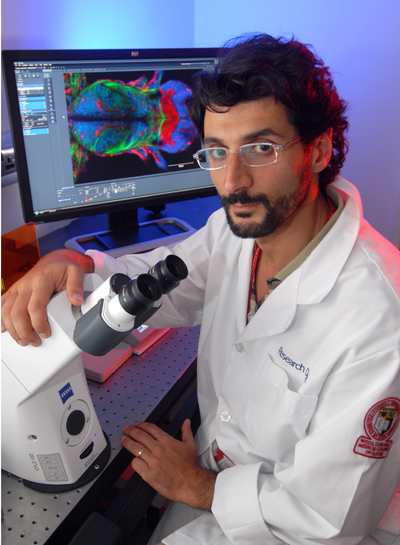WCMC-Q Physician Researcher Targets Ovarian Cancer in Doha
June 2010

“Our contribution to the consortium involves work in the
genomics core lab to view these tumors in a new setting, with
new technology.” - Dr. Rafii Tabrizi.
Ovarian cancer may not be the most common cancer facing women, but it is one of the most lethal. Dr. Jeremie Arash Rafii Tabrizi, assistant professor of genetic medicine in obstetrics and gynecology at WCMC-Q, is working with physicians in Qatar and around the world to improve treatment of and decode the genetics related to this disease.
Ovarian cancer has traditionally been difficult to detect early, because while ultrasounds pick up on changes in the ovaries, they do not convey what a doctor needs to make a clear diagnosis. In addition, the most advanced blood tests related to ovarian cancer are known to display false positives. Thus, ovarian cancer is most often clearly diagnosed after it has already spread to other parts of the abdomen, and research is focused on ways to understand the molecular mechanisms behind this spread so it can be addressed earlier.
Refining Research—A Global Effort
Dr. Rafii Tabrizi is working with cancer centers in France, Singapore, Norway, Taiwan, and Lebanon to explore select ovarian cancer cases and their genetic environments. Because ovarian cancer is highly complex in terms of its start and spread, he and his colleagues are trying a new approach that involves fewer patients and a deeper analysis of the genetic expression of tumor cells and the microenvironment in each case.
“Our approach, with this research consortium, is more targeted. Some researchers say ‘we want to look at the genomics of 500 tumors.’ This kind of strategy has failed as a research tactic for ovarian cancer,” Dr. Rafii Tabrizi said. “Because ovarian cancer manifests very differently from person to person, increasing the sample size can confuse the findings. So we’re asking very specific questions about, for instance, how it extends to the peritoneum or the lymph nodes, and we’re comparing very basically the primary tumors to the metastatic lesions in carefully-selected small groups of patients.”
Dr. Rafii Tabrizi works closely in conjunction with Dr. Einas Al Kuwari and Dr. Imaad Bin Mujeeb, consultants in anatomical pathology at Hamad Medical Corporation, Qatar’s national health provider. At WCMC-Q, he coordinates with Joel Malek, instructor of genetic medicine and director of the genomics laboratory, to look at the disease through the lens of total RNA sequencing and epigenetic studies—methods requiring highly-sophisticated equipment capable of analyzing hundreds of thousands of genetic samples at a time.
“Our contribution to the consortium involves work in the genomics core lab to view these tumors in a new setting, with new technology,” Dr. Rafii Tabrizi said.
Clinical Advances
The ultimate goal is to identify what is driving metastasis in order to create new therapeutic approaches such as targeted therapies or vaccination. In the meantime, the clock ticks for those diagnosed. Different forms of therapy have evolved to treat ovarian cancer, and one key approach involves targeted heat therapy.
Heat supports the action of chemotherapy on tumor cells and kills target cells faster than chemotherapy alone. Yet with all of the success of this approach, cancer cells have figured out how to use other cells—called stromal cells—to shield themselves from it. Dr. Rafii Tabrizi ’s is working with INSERM in France to research this evolutionary race between heat therapy and cancer cells’ attempts to block it.
Ovarian cancer’s resistance to heat therapy is at the leading edge of study into the clinical management of this disease. For this reason, the American Association for Cancer Research has accepted Dr. Rafii Tabrizi and his collaborator Raphael Lis’ research abstract and hosted their presentation entitled “Tumor Associated Mesenchymal Stem Cells Protect Ovarian Cancer Cells from Hyperthermia through Stromal Cell Derived Factor-1 (SDF-1) Secretion,” at their annual meeting in Washington, DC, this past April.
Surgery is often required to assess the spread of ovarian cancer and the best approach to therapy. Until recently, this kind of surgery involved a large incision that took weeks if not months to heal and invited infection along the way.
Dr. Rafii Tabrizi recently performed a new laparoscopic surgery in Doha related to gynecological cancers that have spread to the lymph nodes—a procedure known as retroperitoneal para-aortic laparoscopic lymphadenectomy.
“This laparoscopic procedure increases the recovery speed of the patient, which reduces the time frame from surgery to chemotherapy and this is an important prognosis factor,” he said.
